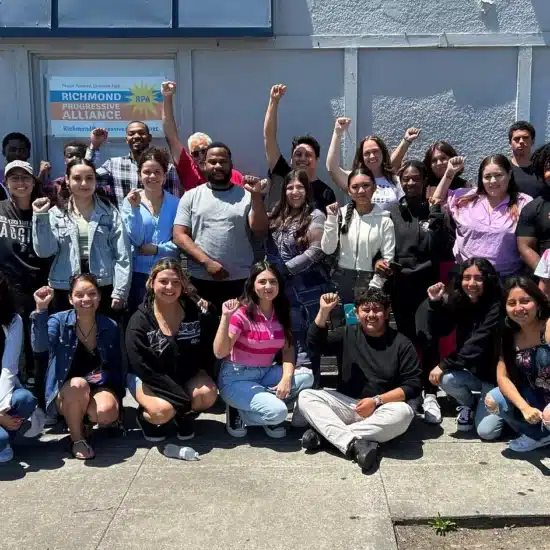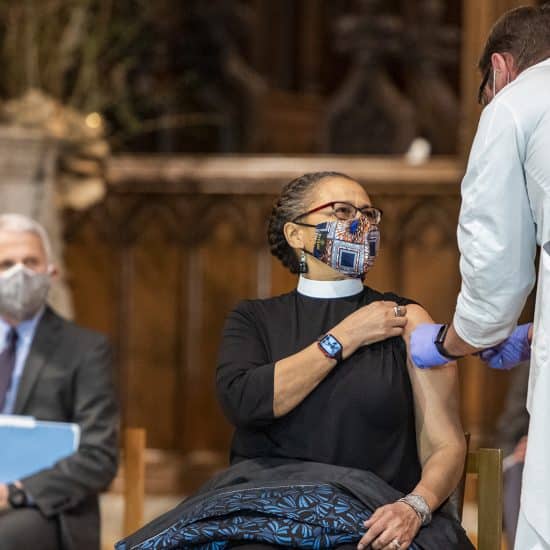Age can influence the career direction a youth minister or campus minister takes. Family transitions may lead to a ministry change, or the minister may feel age has separated him or her from students.
“There may be a time when you feel like you can’t relate. … You may think their world is so different than mine,” said Don Mattingly, assistant to the president for strategic initiatives at Mercer University.

Randy Johnson, minister of youth at First Baptist Church in Richardson, Texas, enjoys spending time with students in his youth group.
|
Mattingly started his ministry as a youth pastor. Then he became a denominational worker specializing in youth and collegiate ministries, first at the Baptist Sunday School Board—now LifeWay Church Resources—and then at Baylor University and Samford University.
He believes two major factors influence the direction a youth minister’s career may take—the individual’s age when entering youth work and whether the minister earns a seminary degree.
“The first thing that takes them out (of youth ministry) is when they go into the pastorate,” Mattingly said.
Money often is a major factor in turning to the pastorate, but age also plays a role. As a young, single adult, Mattingly did “everything,” he said. “But when I married, I transitioned to become a person who loved young people but started investing in lay leaders … because God and then my wife had to come first.”
Some youth pastors seek a different ministry when their children reach junior high or high school.
“I see guys going into the pastorate when their own children come into the youth group, partly because of money—their children are getting closer to college—and because of their relationship with their children,” he said.
As a denominational worker, Mattingly has talked with many church leaders who were looking for a youth minister.
“They all asked about age—the smaller the church, the younger the age they look for. They are looking for an entry-level person,” he said. “The larger churches asked for experience, and so they usually looked at the 25- to 35-year-old range.”
Larger churches also usually can afford to hire a youth minister with a family, and they often insist upon looking only at candidates with a seminary degree. Mattingly believes youth ministers who complete a seminary degree, especially since many churches don’t require it, exhibit “the deep feeling that they want to do it for the rest of their lives.”
Longevity in youth ministry
Passion has kept Randy Johnson in youth ministry 35 years. At nearly 61, Johnson serves at First Baptist Church in Richardson, Texas, a post he has filled 25 years.
He sees three reasons for his longevity at the Richardson church. First, the church’s character allows him to stay. “There is a large core of people who value and appreciate the staff. … There is a culture here” that encourages staffers to stay.
Second, the three senior pastors under whom Johnson has served at First Baptist have been willing to work with him.
“They had the mentality that they were not going to ask people to leave. … Some of my peers have been told by new pastors, ‘You don’t fit my vision for youth ministry.’ That’s painful,” he said.
Third, Johnson’s passion for the ministry remains. “I have never lost my passion for what I do. … At times it’s waned, but I get a kick out of my teenagers and in getting adults involved.”
Continuing to learn about teenagers and their world helps him maintain a strong connection. “Taking a real interest in teenagers … being careful to remember they will be adults … is important,” Johnson said. “I’ve tried my best to see the adult in my teenagers. … I’ve worked hard at affirming them.”
Age has taught Johnson a lesson. “It’s not about me,” he said. He has learned to utilize a team of adult volunteers and to develop student leaders.
Age has made him back away from some activities. “I’m fearful to get on the basketball court,” he said, laughing. “I don’t do lock-ins. … I just show up and go home at midnight.”
At every opportunity to speak on college and seminary campuses, he tells youth ministers, “You can do this no matter what your age.”
‘Parents getting younger’
Jerry Carmichael began his ministry career as a youth pastor in Maryville, Mo. But while attending Northwest Missouri State University, he got a taste of student work as an active participant in and as a short-term interim director of the Baptist Student Union.

Jerry Carmichael
|
Now he serves as Baptist Student Ministries director at the University of Missouri’s main campus in Columbia, a post he has held since 1989.
Charmichael believes age is not as much a factor in a long-term ministry with college students as it can be with youth. “Essentially, you work with people who don’t age,” he said, because the director works with a student for only four years. “The only dose of reality is that parents are getting younger all the time.”
For Carmichael, three differences between youth and student ministries stand out. “The first is that you work with young adults who are involved … because they want to be involved,” he said. “And secondly, there is not as much contact with parents.”
He pointed to the short time a student minister has to work with college students as the third difference. “There is a four-year window of opportunity when young adults are determining what they are going to believe and what they are going to do,” he added. “I am passionate about being a Christian witness at this crossroads between freedom and responsibility.”
Age plays a role in reaching college students, he believes. Especially on a large campus, the director has learned to rely on three younger associate staffers. “I felt the Lord gave a clear direction to build the concept of a multiple-staff ministry,” he said.
Although Carmichael has backed away from some activities, “I still get out and do crazy things,” he said. But he focuses on giving students responsibility.
“My philosophy hasn’t changed over the years—and that is to enable and empower young people to step up into leadership, instead of providing it for them,” he said.
Age has an advantage when working with young adults. “Any time you’re closer to the age of the students, I think there’s more of an acceptance of you,” he said. “But I think the opposite is also true—with age comes wisdom.”




